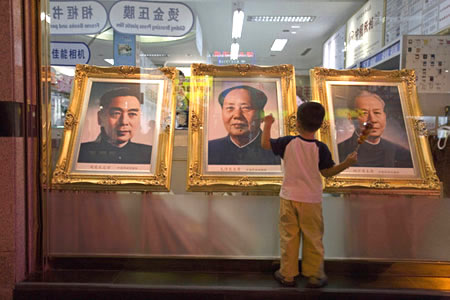The Benevolent
Big Brother brand
China’s meteoric economic growth underpins the argument for a benevolent dictatorship and the China Model. But is good governance a valid substitute for democratic government?
By FRANK CHING
Hong Kong, October 2011

Selling Mao: pictures on Wangfujing Street, Beijing. But will the China Model attract sales globally? China thinks it will.
THE deadly train collision in Wenzhou on 23 July, 2011, may have put a dent in the ‘China model’ of economic growth, but the concept itself is likely to be enduring for two reasons – China’s remarkable achievements since the late 1970s, and the financial crisis that continues to ravage the West. Indeed, if Beijing handles the aftermath of Wenzhou properly, the tragedy may come to be seen as an example of Beijing’s ability to fix shortcomings in its own growth model.
The term ‘China model’ is a Western invention, but has gained currency over the last half dozen years, both in China and overseas. Premier Wen Jiabao has actually said that China doesn’t see China’s development as a model for anyone, saying that all countries should choose paths that suit their particular national conditions.

Frank Ching
Premier Wen Jiabao has actually said that he doesn’t see China’s development as a model for anyone, saying that all countries should choose paths that suit their particular national conditions
However, since the West has been laid low by financial crises in the United States and Europe, and with the Japanese economy stagnant for two decades, the so-called Washington Consensus of combining market economics with democracy has lost much of its appeal in many parts of the world, especially among countries with non-democratic governments.
In addition, Beijing’s good relations with developing countries in general means that they will inevitably look to China – and its authoritarian government able to make decisions without interference from an elected legislature, opposition political parties or a free press – as part of their own modernisation efforts.
And, despite Wen’s reticence, other Chinese officials haven’t been slow to contrast China’s rapid development with the problems in the democratic West. Vice Foreign Minister Fu Ying, in a recent interview with Der Spiegel, pointed out that “at the moment it is the Western governments that are having problems.” Why, she asked, have so many governments made so many mistakes? Why have political parties made commitments they can’t fulfil? And why do they spend so much more than they have? Democracy alone, she said, can’t put food on the table.
She went on to indicate that democracy shouldn’t be necessarily be equated with a multiparty election system, a position shared by other proponents of the China model. It’s a view echoed by Thus Han Zhu, a research fellow at the Sinologizing Research Center, who says that the emphasis should be on good governance, not democracy.
In an article in China Daily he wrote: “In the West, democracy is reflected only at the time of elections, but in China democracy has to navigate the entire process of administration, which puts enormous pressure on the government.” He said polls conducted by the Pew Research Center and others reflect “the degree of satisfaction of Chinese people toward the speed and direction of the current development process.”
Zhang says that some concepts, such as the idea that “good versus poor governance is far more important than democratic versus authoritarian government,” might resonate overseas
Another commentary published recently in China Daily, meanwhile, took direct aim at the United States. “The debt crisis has exposed the defects rather than the advantages of its system,” the commentary said. “Even many US citizens have appealed for introspection and reform of the country’s political system.”
“Democracy cannot solve every problem. It is not the be all and end all of political structures, and it should learn from the experiences and advantages of other political systems,” it concluded.
Yet while Chinese commentators have been scathing in their view of the United States, and keen to talk up China’s achievements, they generally concede that the Chinese Model can’t simply be copied by other countries. Zhang Weiwei of the Geneva School of Diplomacy and International Relations, for example, describes China as a ‘civilization-state,’ a status that can be claimed by few other countries. Still, he argues, “as China rises, the influence of the Chinese Model on the outside world will likely be greater and greater.”
How? Zhang says that some concepts, such as the idea that “good versus poor governance is far more important than democratic versus authoritarian government,” might resonate overseas. And, on the face of it, this is an attractive idea – China certainly boasts a government capable of making major decisions that are frequently in the interests of the people.
This article is reprinted from The Diplomat with the author’s permission. Frank Ching opened The Wall Street Journal’s bureau in China in 1979. Now based in Hong Kong, he writes a regular column on Chinese affairs. His articles have appeared in Foreign Affairs, Foreign Policy, World Policy Journal, China Quarterly, Current History, the South China Morning Post, and the Washington Quarterly, among other publications. Twitter:@FrankChing1
Post a comment
- HOME
- BUSINESS
- DEVELOPMENT
- ENERGY
- ENVIRONMENT
- HEALTH
- INFORMATION
- POLITICS
- SECURITY
- SHIPPING
- SOCIETY
- TRAVEL
- TRENDS
Long term impact of Gaza attack on Israel
Consequences of Palestinian conflict and finger-pointing in the blame game ... See world opinion
Curse of curation
PR-speak is turning our conversations into outright gibberish... more…
